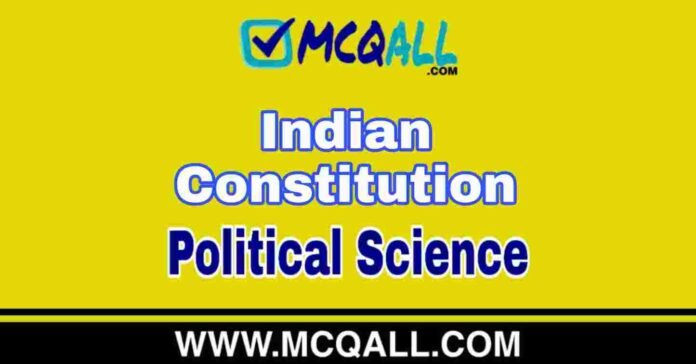Indian Constitution – Political Science MCQ Question and Answer
Indian Constitution – Political Science MCQ Question and Answer : Indian Constitution – Political Science MCQ Question and Answer is given below. This Indian Constitution – Political Science MCQ / Indian Constitution – Political Science Quiz / Indian Constitution – Political Science Question and Answer / Indian Constitution – Political Science Multiple Choice Question, Short Question, Question and Answer, Suggestion, Notes are very important for school, college and various competitive or job exams and interviews.
Those of you who are looking for Indian Constitution – Political Science MCQ Question and Answer, can read the questions and answers given below.
Indian Constitution – Political Science MCQ
- Who among the following was the first Tribal Speaker of Lok Sabha ?
(A) G.V. Mavalankar
(B) G.M.C. Joshi
(C) Manohar Joshi
(D) P. A. Sangma
Answer : P. A. Sangma
Solution: P. A. Sangma became the first tribal speaker of Lok Sabha in 1996.
- Which one of the following statements about Rajya Sabha is correct?
(A) It is not subject to dissolution.
(B) Its members are chosen by direct election from territorial constituencies in the States.
(C) It is required to choose, as soon as may be a member of the Rajya Sabha to be the Chairman thereof.
(D) The Attorney General of India does not have the right to speak in Rajya Sabha.
Answer : It is not subject to dissolution.
Solution: Only the first statement is correct. Its members are elected by the elected members of the Legislative Assemblies [Art. 80 (4)]. The tenure of Member of Council of States is 6 years, and 1/3rd members retire after every 2 years. The council of States shall not be subject to dissolution. The Vice-President of India is ex-officio chairman of the Council of States, and Attorney General of India has the right to speak in both the Houses of the Parliament.
- Which among the following States has the lowest number of elected members in the Rajya Sabha ?
(A) Chhattisgarh
(B) Himachal Pradesh
(C) Jharkhand
(D) Jammu and Kashmir
Answer : Himachal Pradesh
Solution: The number of members elected to Rajya Sabha from the given States is as follows; Himachal Pradesh-3, Jammu and Kashmir-4, Chhattisgarh-5, Jharkhand-6, Thus, the lowest number of members elected to Rajya Sabha is from Himachal Pradesh.
- Who can legislated on the subjects which are not included in any of the lists of subjects given in the Constitution ?
(A) Supreme Court
(B) Parliament
(C) State Legislature
(D) Regional Councils
Answer : Parliament
Solution: Article 248 of Indian Constitution provides residual legislative powers to the Parliament. According to Article 248, the Parliament has exclusive power to make any law on any matter not enumerated in State or Concurrent list.
- Which one of the following subject is not included in the provisions of the Money Bills ?
(A) Provision regarding taxes
(B) Provision regarding borrowings
(C) Provision regarding custody of the Consolidated and Contingency Funds
(D) Provision for imposition of fines or penalties
Answer : Provision for imposition of fines or penalties
Solution: Under Article 110 of the Constitution, it has been specified that the provisions regarding taxes, borrowings and custody of the Consolidated and Contingency Funds are included in the provisions of the Money Bill. But Provisions for the imposition of fines or penalties are not included in the provisions of the Money Bill.
- Which of the following official documents is related with India ?
(A) Green Paper
(B) White Paper
(C) Yellow Book
(D) Blue Book
Answer : White Paper
Solution: White Paper is an official document issued by the Government of India or by its Ministry which explains the Government policies on a particular subject and allows the Government to collect feedback before a bill is prepared.
- The Chief Legal Advisor to Government of India is:
(A) Solicitor General of India
(B) Chief Justice of Supreme Court
(C) Secretary Ministry of Law
(D) Attorney General of India
Answer : Attorney General of India
Solution: The Attorney General of India is the Chief Legal Adviser to Government of India. In the Performance of his duties, the Attorney General shall have right of audience in all courts in the territory of India .
- Who is called the Guardian of Public Purse ?
(A) President
(B) Comptroller and Auditor General
(C) Parliament
(D) Council of Ministers
Answer : Comptroller and Auditor General
Solution: The Constitution of India (Art. 148) provides for an Independent Office of the Comptroller and Auditor General of India (CAG). CAG is the head of the Indian Audit and Accounts Department and the guardian of public expense.
- For election to the Lok Sabha, a nomination paper can be filed by –
(A) anyone residing in India
(B) a resident of the constituency from which the election is to be contested
(C) any citizen of India whose name appears in the electoral roll of a constituency.
(D) any citizen of India
Answer : any citizen of India whose name appears in the electoral roll of a constituency.
Solution: According to section 4(d) of Representation of the People Act, 1951, for election to the Lok Sabha, a nomination paper can be filed by any citizen of India whose name appears in the electoral rolls of any parliamentary constituency.
- Who holds power to appoint the nominees from Anglo-Indian Community in the Lok Sabha ?
(A) Minorities Commission
(B) President of India
(C) Prime Minister
(D) Vice-President
Answer : President of India
Solution: The President holds the power to nominate the Anglo-Indian members in Lok Sabha. According to Article 331, if the President is of the opinion that the Anglo-Indian community is not adequately represented in the House of the People, he may nominate not more than 2 members of that community.
Political Science MCQ Question and Answer
See also: – Political Science MCQ Question and Answer Click Here
Indian Constitution – Political Science MCQ Question and Answer
Indian Constitution – Political Science MCQ Question and Answer: Indian Constitution – Political Science MCQ Question and Answer – Indian Constitution – Political Science MCQ Question and Answer has been discussed above.
Indian Constitution – Political Science Multiple Choice Question and Answer
Indian Constitution – Political Science Multiple Choice Question and Answer: Indian Constitution – Political Science Multiple Choice Question and Answer – Indian Constitution – Political Science Multiple Choice Question and Answer discussed above.
Indian Constitution – Political Science Quiz
Indian Constitution – Political Science Quiz : Indian Constitution – Political Science Quiz – Indian Constitution – Political Science Quiz has been discussed above.
Indian Constitution – Political Science Question and Answer in English
Indian Constitution – Political Science Question and Answer in English: Indian Constitution – Political Science Question and Answer in English – Indian Constitution – Political Science Question and Answer in English.
Indian Constitution – Political Science MCQ Question and Answer
If you benefit from this “Indian Constitution – Political Science MCQ Question and Answer” post then our efforts will be successful. Also visit our MCQALL.COM website or follow us on various social networking sites (Telegram, Facebook, Youtube, Instagram, Twitter) to know MCQ – Multiple Choice Question Quiz on various topics, questions and answers quiz from GK and Daily Current Affairs. Thank you.












